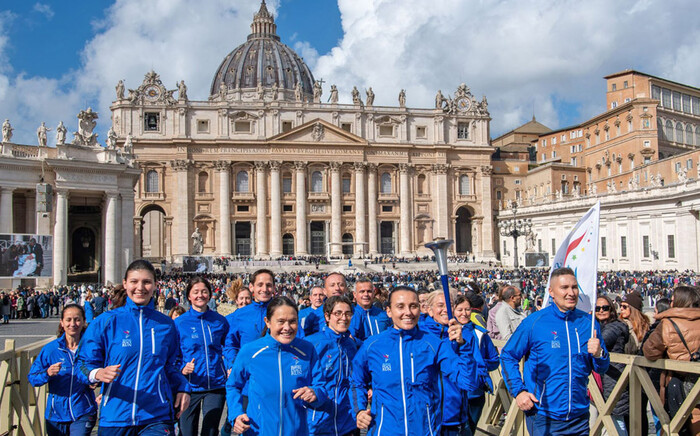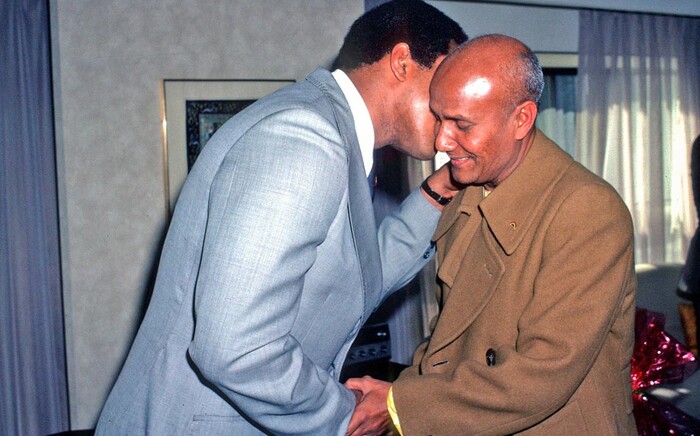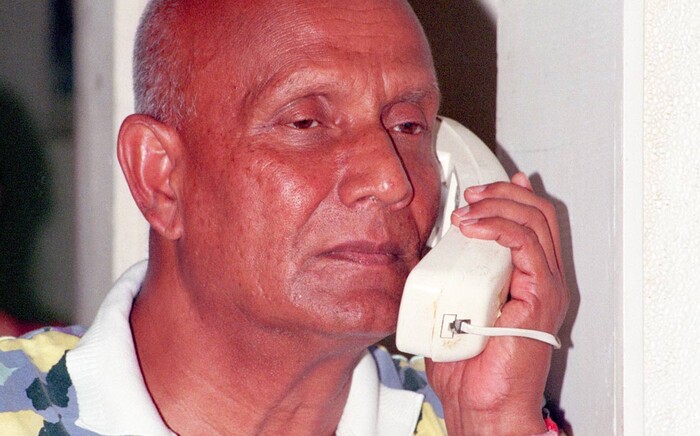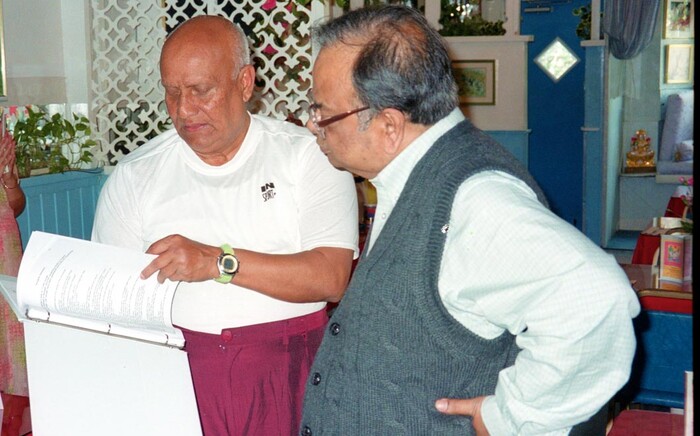October 13, 2007: Tribute To Sri Chinmoy (essay) by M.
Sri Chinmoy explains that the consciousness of a realised soul is deeply connected on every level with all those around him. He writes of the lowing of the cows at the passing of Ramdas Kathiya Baba. In 2003, I took this as a point of departure to write a play called The Last Crossword. Set in ancient India, it was about a disciple who takes the master's presence for granted. One day, he wakens to find that a cow is lowing, and even a tiger is shedding tears. He has a series of misadventures, until he finally realises the truth: the Master has taken his Mahasamadhi.
Today, I am that cow, I am that tiger, and I am that disciple.
Sri Chinmoy used to say something most significant: that a spiritual master represents hope to suffering humanity. I grew up with a lot of sadness in my family, and even as an adult it's difficult to shake that sadness. For me, Sri Chinmoy's living presence in the physical represented hope. As a human being, I related to him as another human being. He was my friend. As a human being, my loss is inconsolable.
I had been making some videos I thought he would like. I hoped to give them to him. One was a documentary about Robert F. Kennedy. When his brother was killed, Robert was devastated for a long time. At Jacqueline's suggestion, he began reading a lot of poetry - especially the Greeks. He became fond of these words by Aeschylus:
"He who learns must suffer. And even in our sleep, pain that cannot
forget falls drop by drop upon the heart. And in our own despair,
against our will, comes wisdom to us, by the awful grace of God."
The documentary showed how grief ultimately strengthened Robert Kennedy and brought out his compassion for all suffering people everywhere.
When he walked onto the podium at the Democratic Convention - August 27, 1964 - there was a spontaneous demonstration of applause that lasted 22 minutes. Finally, the crowd allowed him to speak. He said:
"When I think of President Kennedy, I think of what Shakespeare said in Romeo and Juliet:
'When he shall die, take him and cut him out in little stars, and he shall make the face of heaven so fine that all the world will be in love with night, and pay no worship to the garish sun.'"
As a human being, my loss is inconsolable. In struggling to come to terms with grief, I am heartened by the living legacy of Sri Chinmoy: his writings, music, art, and record of accomplishments, his devoted students determined to continue the work. I take heart also in these words by the late African-American songwriter Bernice Johnson Reagon:
They are falling all around me,
They are falling all around me,
They are falling all around me,
The strongest leaves of my tree.
Every paper brings the news that,
Every paper brings the news that,
Every paper brings the news that,
The teachers of my sound are moving on.
Death comes and rests so heavy,
Death comes and rests so heavy,
Death comes and rests so heavy,
Your face I'll never see, I'll never see you any more.
But you're not really gonna leave me,
You're not really gonna leave me,
You're not really gonna leave me,
It is your path I walk;
It is your song I sing;
It is your load I take on;
It is your air I breathe;
It's the record you set that makes me go on;
It's your strength that helps me stand;
You're not really, you're not really gonna leave me.
I will try to sing my song right,
I will try to sing my song right,
I will try to sing my song...
Be sure to let me hear from you.
As a poet, I like the ambivalence of the second to last line, which seems to say: I will try to sing my song - but maybe I won't get it right, maybe nobody will listen, but at least I'll sing it.
As human beings, we are afflicted with many problems. One which I happen to suffer from is the feeling that what I have to offer isn't good enough - that I need to study more, practice more, edit more, fix this, fix that, and then I will have something worth offering.
No one was ever a more kind reader of my poetry than Sri Chinmoy. No one ever showed so much love in response to even the smallest offering, however imperfect. The reason he could show us so much love is that he saw his Lord Supreme in us.
As a spiritual being, I try to take heart in Sri Chinmoy's words from his play The Buddha and Ananda, where the Buddha says:
"Ananda, do not cry for me. I tell all of you not to cry for me.
Ananda, I have told you repeatedly that everything is transient on
earth. There is nothing everlasting here. Anything that comes into life
will have to give up life. ... My spiritual journey began with
renunciation and compassion, and today, at the end of my journey's
close, I offer to the world the same message: renunciation and
compassion. O Ananda, do not grieve."
- From: Siddhartha Becomes the Buddha
I am reminded of what I wrote to a friend at the death of another friend who I loved: "Cosmic character that he is, he is teaching us all the lesson of impermanence. May we use his gift well."
After two days of constant grieving, finally I was able to meditate. And in meditation, many things became clearer. Much of my grief was selfish, coming from the grasping part of my nature. Sri Chinmoy was MY friend, MY friend. I NEEDED him. How could he just die? So selfish. And that selfish part of my nature lived in a fool's paradise: Sri Chinmoy would always be around, and I would have infinite opportunities to see him. So foolish.
In my meditation, a photograph became central to coming to clarity - a photo I remembered from Radio Sri Chinmoy, where Virendra Gauthier and other band members are playing, and Sri Chinmoy is passing by in his little cart. In the last years of his life, he found walking difficult and painful.
In truth, Sri Chinmoy fulfilled in every way imaginable the role which he himself described in this poem from My Flute:
I have become the world's lowest slave
Your Breath to serve in man, the grave.
Everything he fulfilled, fulfilled, fulfilled. Those things left undone were undone only because there was no receptivity on earth. Never did he fail to make a valiant effort to accomplish something for his beloved Lord Supreme, and for humanity. Now it will take literally hundreds of years for humanity to catch up to his speed, his vision. How can I mourn when I was given the great privilege to be among the first generation to witness his incredible sacrifice?
The spiritual part of my being tries to help me, console me, by teaching me these things. But as a human being, I am still inconsolable. I would give anything to see Sri Chinmoy on earth for just one more day, so that I could give him presents I was saving for him, and thank him again for all he has done for me - for his infinite patience, kindness, and compassion. I want to cling, cling, cling to Sri Chinmoy. That is my grasping nature. And every time I think that spiritual wisdom has triumphed over human emotion, I find there are still more tears to be cried.
But then I remember the photograph. Would I really want Sri Chinmoy to stay on earth indefinitely in a body that can no longer match his tireless vision? Only a selfish person would want that.
Sri Chinmoy helped thousands of people find freedom. For most of us, it was spiritual freedom; but he also encouraged political freedom - freedom for East Timor. In nominating him for the Nobel Peace Prize in 2007, Prof. St-Amand of the University of Ottawa cites this as one of his outstanding accomplishments.
Sri Chinmoy also championed freedom in art. This is not yet so well known, because few critics have taken in the full breadth of vision his music, art and poetry embodies. But it's all there for future historians. I take heart that Sri Chinmoy will be reborn when he is discovered in this way. His art will be new when a new generation sees it with fresh eyes and discovers its boundless depths. He will be a new guru when a new generation dares to look inward, and finds there a loving, reassuring presence guiding their own fragile steps to freedom.
The biggest lesson my spiritual self tries to teach me is that Sri Chinmoy is still very much alive. The great messenger of freedom has now been freed from the cage of the body; but in the inner world his spirit burns brightly and constantly.
The Soul-Bird
by Sri Chinmoy
O world-ignorance,
Although
You have shackled my feet,
I am free.
Although
You have chained my hands,
I am free.
Although
You have enslaved my body,
I am free.
I am free because I am not of the body.
I am free because I am not the body,
I am free because I am the soul-bird
That flies in Infinity-Sky.
I am the soul-child that dreams
On the Lap of the immortal King Supreme.
M.
See also: Poetic tributes by M.























